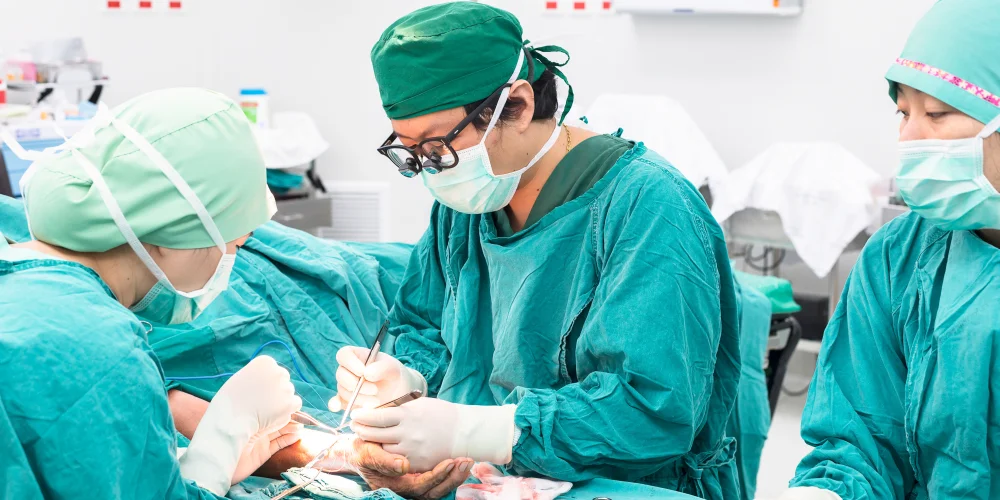AV fistula for dialysis surgery
Expertly Crafted Vascular Access for Effective Dialysis Treatment
Patients suffering from chronic kidney diseases (CKD) and end-stage kidney disease (ESRD) needing regular hemodialysis, having a safe and efficient access point to the vascular system is essential. The procedure of accessing dialysis (dialysis), in particular creating the arteriovenous (AV) fistula is the most preferred option for long-term dialysis treatments. Here at Chirayu Super Speciality Hospital, we are specialized in AV fistula for dialysis surgery, which provides our patients with long-lasting and effective access point that enables quality dialysis treatments. Our experienced team of Vascular surgeons makes sure that each fistula is adapted to the specific needs of each patient which leads to more effective outcomes and overall health.

What is AV Fistula For Dialysis?
AV fistula for dialysis surgery is the process of creating connections between an artery with a vein referred to as an arteriovenous (AV) fistula, in order to offer a high-flow artery access point for hemodynamic therapy. A AV fistula for dialysis usually is made in the arm by connecting the vein directly to an artery nearby. The connection causes the vein to expand and become stronger, making it simpler to insert dialysis needles and providing a stable long-term source of access. Fistulas AV are considered to be the best option for dialysis access because of their durability, lower chance of getting infections, and superior overall performance when compared to other methods of access like central vein catheters.
Who Performs Your Surgery?
The Chirayu Super Speciality Hospital creation of an AV fistula for Dialysis is carried out by experienced Vascular surgeons that specialize in access to dialysis procedures. Our team is educated in the most advanced surgical techniques and collaborates with dialysis specialists and nephrologists to provide comprehensive treatment. Our surgeons concentrate on safety of patients, reducing complications, and creating top-quality AV fistulas to support efficient dialysis treatment.
Types of AV Fistula Surgery
- Radiocephalic Fistula AV : This is by far the most frequent type of fistula that occurs through the connection of radial arterial with the vein of cephalic within the wrist. It is typically the first option for dialysis access because of its location and its accessibility.
- Brachiocephalic AV Fistula : In this form brachial artery, it is linked to the cephalic artery near the elbow. This is done when wrist veins aren’t appropriate or were previously used to treat other fistulas.
- Transposed Brachio-Basilic AV Fistula : The process involves connecting the brachial vein to the basilic vein. The vein is then surgically repositioned to the skin’s surface in order to facilitate gain access to dialysis. This procedure is employed when brachiocephalic or radiocephalic options are not possible.
Symptoms Indicating the Need for Dialysis Access Surgery
- Diagnosis of chronic kidney disease (CKD) or end-stage renal disease (ESRD) needing regular hemodynamics.
- Dialysis access issues that exist including failure of AV grafts, or frequent infections in central vein catheters.
- A long-term, reliable and long-lasting access point to continuous dialysis treatment.
- The following recommendations are from nephrologists and health professionals regarding the creation of AV fistulas.
Diagnosis for Dialysis Access Surgery
The diagnosis and evaluation of AV fistula for dialysis surgery usually involves an exam of the arms of the patient to evaluate artery and vein quality. Ultrasound imaging is a method to trace the veins and arteries, giving precise information on their flow, size, and their suitability for the creation of fistulas. Based on these measurements the vascular surgeon will determine the best kind of AV fistula as well as the best location for surgery.
Treatment Process
The procedure begins with a consult with a vascular surgeon to talk about the process, its advantages and risk. AV fistula for dialysis is generally performed as an outpatient under local anesthesia, and sometimes with the aid of sedation. During the operation the surgeon will make an incision of a tiny size in the arm to join an artery with an artery, creating a fistula. The procedure generally takes about around 1-2 hours. Patients are usually able to return home the next day. Following surgery the fistula must have time to grow, typically between 6 and 12 weeks, before it is able to be used to dialysis.
Care and Recovery After Surgery
The post-operative care is vital to the long-term success and durability of the AV fistula for dialysis. Patients are advised to stay away from any strenuous lifting or activities using the arm on which the fistula formed. Monitoring the fistula regularly for signs of maturation, like the strong heartbeat and a “thrill” sensation, is crucial. Patients must keep the area clean and follow the instructions from their surgeon to avoid infections. The follow-up appointment will be scheduled to assess the progress of the fistula as well as the readiness to undergo dialysis.
Advantages of Choosing Our Surgery Services
Specialized Vascular Surgeons
Our team of highly trained vascular surgeons has extensive experience in AV fistula creation, ensuring high success rates and optimal patient outcomes.
Personalized Care Plans
We tailor each surgery to meet the unique needs of our patients, offering personalized care and monitoring throughout the treatment process.
Advanced Surgical Techniques
We utilize the latest technology and techniques to minimize complications, promote quicker recovery, and enhance the durability of the AV fistula.
What Our Patients Say
Read about our patients positive experiences and how Chirayu Super Speciality Hospital has positively impacted their health and well-being.


The AV fistula has made a significant difference in my dialysis experience. I can live my life more normally now.


I had a quick recovery after my AV fistula surgery, and it’s been a great access point for my dialysis treatment.


The care I received was outstanding. The doctors and nurses were compassionate and made sure my surgery was a success.


After getting my AV fistula surgery at Chirayu, my dialysis sessions have been much smoother and more effective. Thank you!
Meet Our Medical Specialists
"Our expert vascular surgeons specialize in AV fistula surgery, providing reliable and effective access for your dialysis needs. "
Frequently Asked Questions
Here, we provide answers to some of the most commonly asked questions to help you better understand about our surgery services. If you have any additional questions, please do not hesitate to contact us.
An AV fistula is a surgical connection between an artery and a vein, typically in the arm, used for hemodialysis.
AV fistulas are preferred because they last longer, have a lower risk of infection, and provide better blood flow for dialysis.
Risks include infection, bleeding, and the possibility of the fistula not maturing properly. Our surgeons take precautions to minimize these risks.
The surgery is performed under local anesthesia, so there is minimal discomfort during the procedure. Mild pain or soreness may be felt afterward.
AV fistulas usually take 6-12 weeks to mature before they can be used for dialysis.



